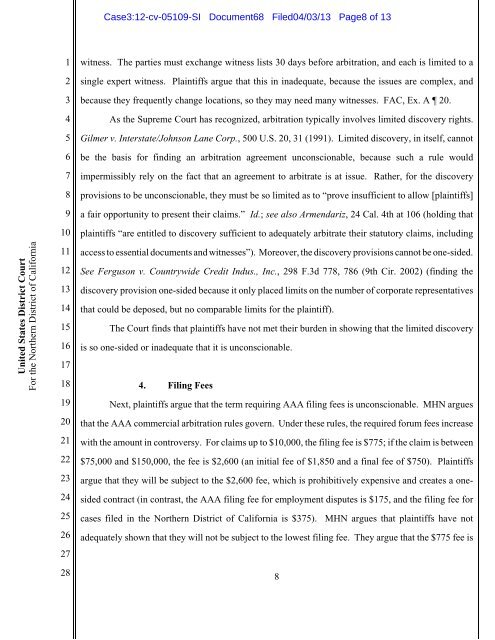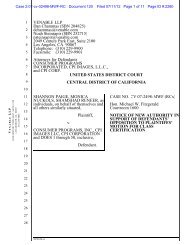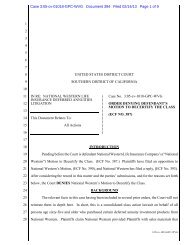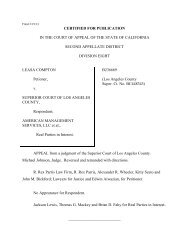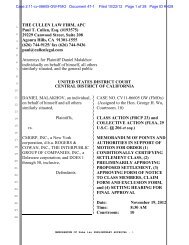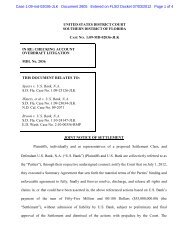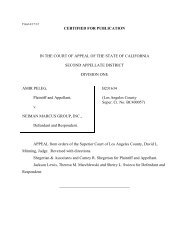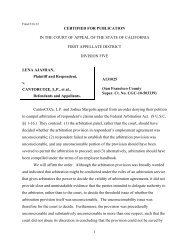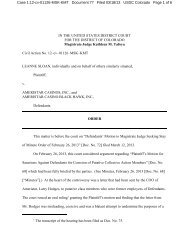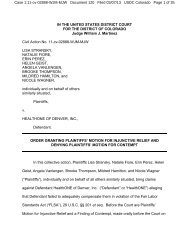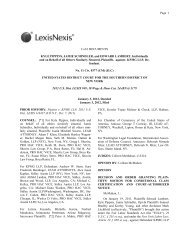order denying motion to compel arbitration - Impact Litigation Journal
order denying motion to compel arbitration - Impact Litigation Journal
order denying motion to compel arbitration - Impact Litigation Journal
You also want an ePaper? Increase the reach of your titles
YUMPU automatically turns print PDFs into web optimized ePapers that Google loves.
Case3:12-cv-05109-SI Document68 Filed04/03/13 Page8 of 13<br />
1<br />
2<br />
3<br />
4<br />
5<br />
witness. The parties must exchange witness lists 30 days before <strong>arbitration</strong>, and each is limited <strong>to</strong> a<br />
single expert witness. Plaintiffs argue that this in inadequate, because the issues are complex, and<br />
because they frequently change locations, so they may need many witnesses. FAC, Ex. A 20.<br />
As the Supreme Court has recognized, <strong>arbitration</strong> typically involves limited discovery rights.<br />
Gilmer v. Interstate/Johnson Lane Corp., 500 U.S. 20, 31 (1991). Limited discovery, in itself, cannot<br />
United States District Court<br />
For the Northern District of California<br />
6<br />
7<br />
8<br />
9<br />
10<br />
11<br />
12<br />
13<br />
14<br />
15<br />
16<br />
17<br />
18<br />
19<br />
20<br />
21<br />
22<br />
23<br />
24<br />
25<br />
26<br />
27<br />
be the basis for finding an <strong>arbitration</strong> agreement unconscionable, because such a rule would<br />
impermissibly rely on the fact that an agreement <strong>to</strong> arbitrate is at issue. Rather, for the discovery<br />
provisions <strong>to</strong> be unconscionable, they must be so limited as <strong>to</strong> “prove insufficient <strong>to</strong> allow [plaintiffs]<br />
a fair opportunity <strong>to</strong> present their claims.” Id.; see also Armendariz, 24 Cal. 4th at 106 (holding that<br />
plaintiffs “are entitled <strong>to</strong> discovery sufficient <strong>to</strong> adequately arbitrate their statu<strong>to</strong>ry claims, including<br />
access <strong>to</strong> essential documents and witnesses”). Moreover, the discovery provisions cannot be one-sided.<br />
See Ferguson v. Countrywide Credit Indus., Inc., 298 F.3d 778, 786 (9th Cir. 2002) (finding the<br />
discovery provision one-sided because it only placed limits on the number of corporate representatives<br />
that could be deposed, but no comparable limits for the plaintiff).<br />
The Court finds that plaintiffs have not met their burden in showing that the limited discovery<br />
is so one-sided or inadequate that it is unconscionable.<br />
4. Filing Fees<br />
Next, plaintiffs argue that the term requiring AAA filing fees is unconscionable. MHN argues<br />
that the AAA commercial <strong>arbitration</strong> rules govern. Under these rules, the required forum fees increase<br />
with the amount in controversy. For claims up <strong>to</strong> $10,000, the filing fee is $775; if the claim is between<br />
$75,000 and $150,000, the fee is $2,600 (an initial fee of $1,850 and a final fee of $750). Plaintiffs<br />
argue that they will be subject <strong>to</strong> the $2,600 fee, which is prohibitively expensive and creates a onesided<br />
contract (in contrast, the AAA filing fee for employment disputes is $175, and the filing fee for<br />
cases filed in the Northern District of California is $375). MHN argues that plaintiffs have not<br />
adequately shown that they will not be subject <strong>to</strong> the lowest filing fee. They argue that the $775 fee is<br />
28 8


